Malcolm Jenkins backs changes to Philly’s cash-bail system he says ‘punishes poverty’
Eagles safety Malcolm Jenkins joined Philadelphia's two top attorneys in calling on judges to consider their cause when setting bail amounts for defendants.
-
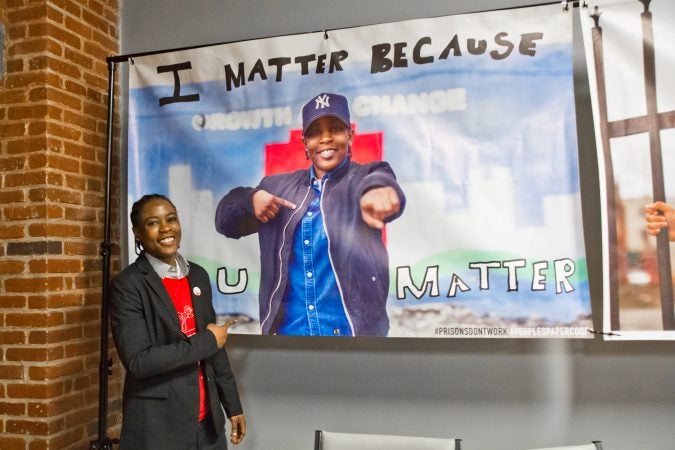
LaTonya Myers spent nine months in prison because she couldn’t afford to post bail before she was acquitted at trial. She now works for the Defender Association of Philadelphia as a bail navigator. (Kimberly Paynter/WHYY)
-
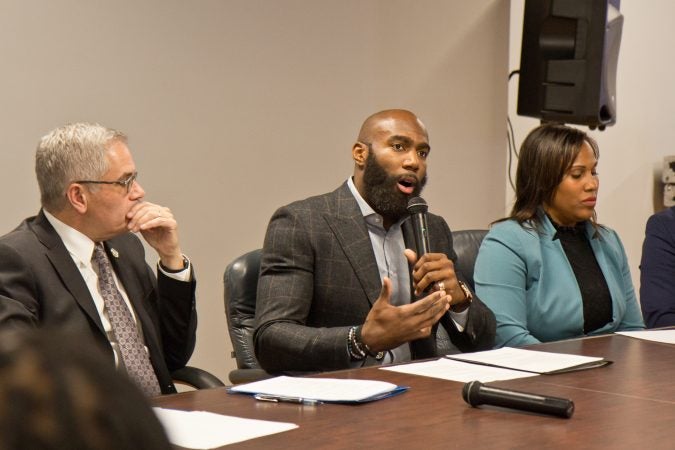
Eagles safety Malcolm Jenkins talks about Philadelphia’s cash-bail system with community organizers. (Kimberly Paynter/WHYY)
-
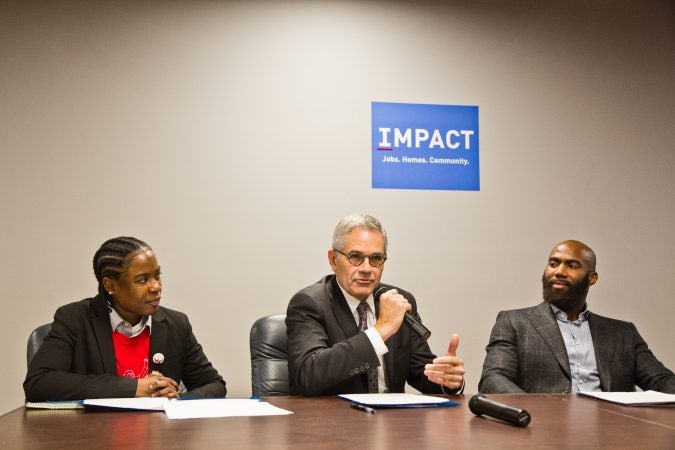
Philadelphia District Attorney Larry Krasner speaks at a “No Cash Bail” event with bail navigator LaTonya Myers and Eagles safety Malcolm Jenkins.(Kimberly Paynter/WHYY)
-
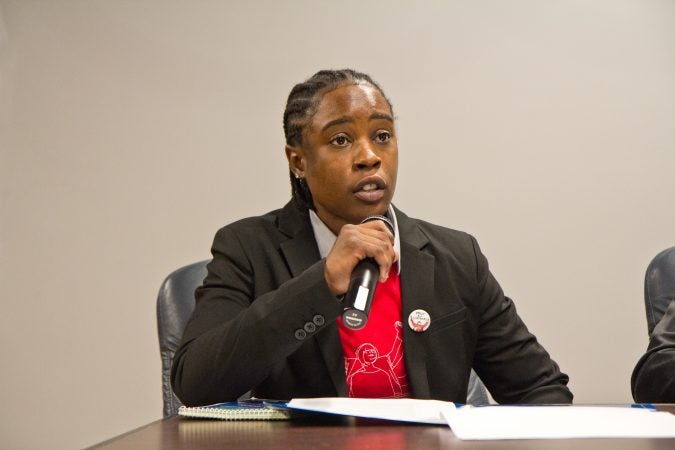
LaTonya Myers spent nine months in prison because she couldn’t afford to post bail before she was acquitted at trial. She now works for the Defender Association of Philadelphia as a bail navigator. (Kimberly Paynter/WHYY)
-
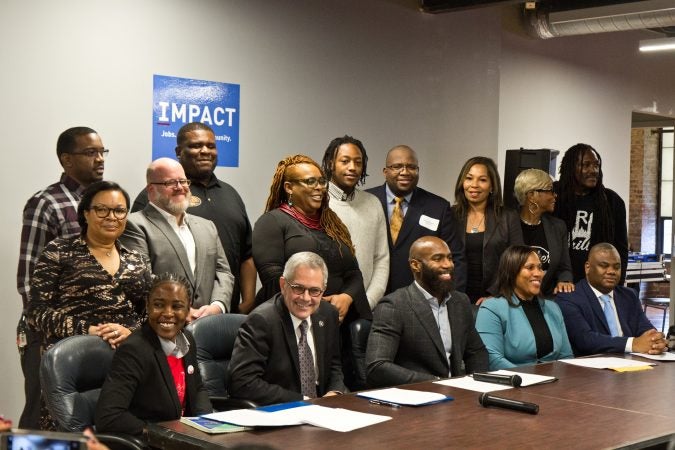
Eagles safety Malcolm Jenkins talks about Philadelphia’s cash-bail system with community organizers. (Kimberly Paynter/WHYY)
-
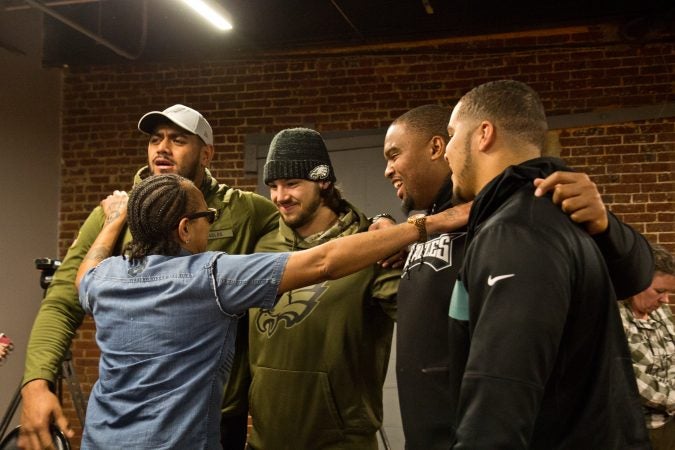
Faith Bartley with the Village of Arts and Humanities in Philadelphia meets members of the Philadelphia Eagles football team. (Kimberly Paynter/WHYY)
Less than a week after donating bail money for nine people – and a day after helping the Philadelphia Eagles secure a season-saving win – Malcolm Jenkins grabbed a seat inside a Kensington nonprofit to deliver a simple message: The city’s cash-bail system has to go.
“The cash-bail system punishes poverty and nothing else. If you’re wealthy, you buy your way out, and if you’re poor, you stay in jail,” said Jenkins during a Monday morning press conference at Impact Services, another nonprofit that helps former inmates after they’re released. In 2017, Jenkins co-founded the Players Coalition, a nonprofit focusing on issues of social justice and racial equity.
Flanking Jenkins at a long table were the city’s top two lawyers: Philadelphia District Attorney Larry Krasner and Chief Public Defender Keir Bradford-Grey, who, despite representing opposite sides of the courtroom, agree the city’s cash-bail system needs to change.
In mid-February, Krasner ordered prosecutors to stop asking for cash bail for 25 nonviolent crime categories, including certain drug possession charges, driving under the influence, retail theft, and resisting arrest. Krasner said that move has not compromised public safety as some had feared.
“Everybody said, ‘The city is going to be on fire. They’re going to run in the front door and take your loved one out the back door.’ Except, no, that’s not what happened,” said Krasner.
His evidence: The county’s jail population has decreased since he took office in January. When he started, there were 6,500 inmates. Today, there are 4,918.
Krasner also said defendants are showing up to their court dates.
“It worked. The only outcome of all of this was that we reduced mass incarceration, we saved the taxpayers a ton of money, and we were able to close a jail,” he said, referring to plans to shutter the century-old House of Corrections in Northeast Philadelphia by 2020.
However, Philadelphia can’t end cash bail on its own. As in New Jersey, the city will need lawmakers in Harrisburg or the Pennsylvania Supreme Court to eliminate it from the state’s criminal code.
In the meantime, Bradford-Grey and others are hopeful their advocacy will convince local judges to consider their cause when setting bail amounts for defendants.
“Justice reform is not quick. It’s a steady, continuous process. It’s not a policy — it’s a practice, and it’s a shared understanding. We all have a responsibility,” said Bradford-Grey.
That’s one of the reasons why LaTonya Meyers took a full-time job last month with the Defender Association of Philadelphia, helping people prepare for life after prison before they’re released.
Meyers, 28, also has personal experience being locked up because she couldn’t afford to post bail — and she wants to make sure that doesn’t happen to other people.
“I came home motivated to try to raise awareness on some of these issues that go on and some of the ripple effect that it’s caused,” she said.
Last November, Meyers was released from prison after spending nine months behind bars. Arrested for allegedly breaking into the Center City apartment she shared with her then-girlfriend, she was eventually acquitted of all charges at trial.
Meyers said she stayed locked up because she didn’t have $1,500 – 10 percent of her $15,000 bail. She had a job as a security guard, but was just scraping by, barely able to afford food and transportation to work. While she was in prison, she missed the start of her college career and two family funerals, including one for the aunt who raised her.
“You can’t give someone a $15,000, $20,000 bail when you’re not even giving them the opportunity to make $15,000, $20,000 a year,” said Meyers.
WHYY is your source for fact-based, in-depth journalism and information. As a nonprofit organization, we rely on financial support from readers like you. Please give today.





